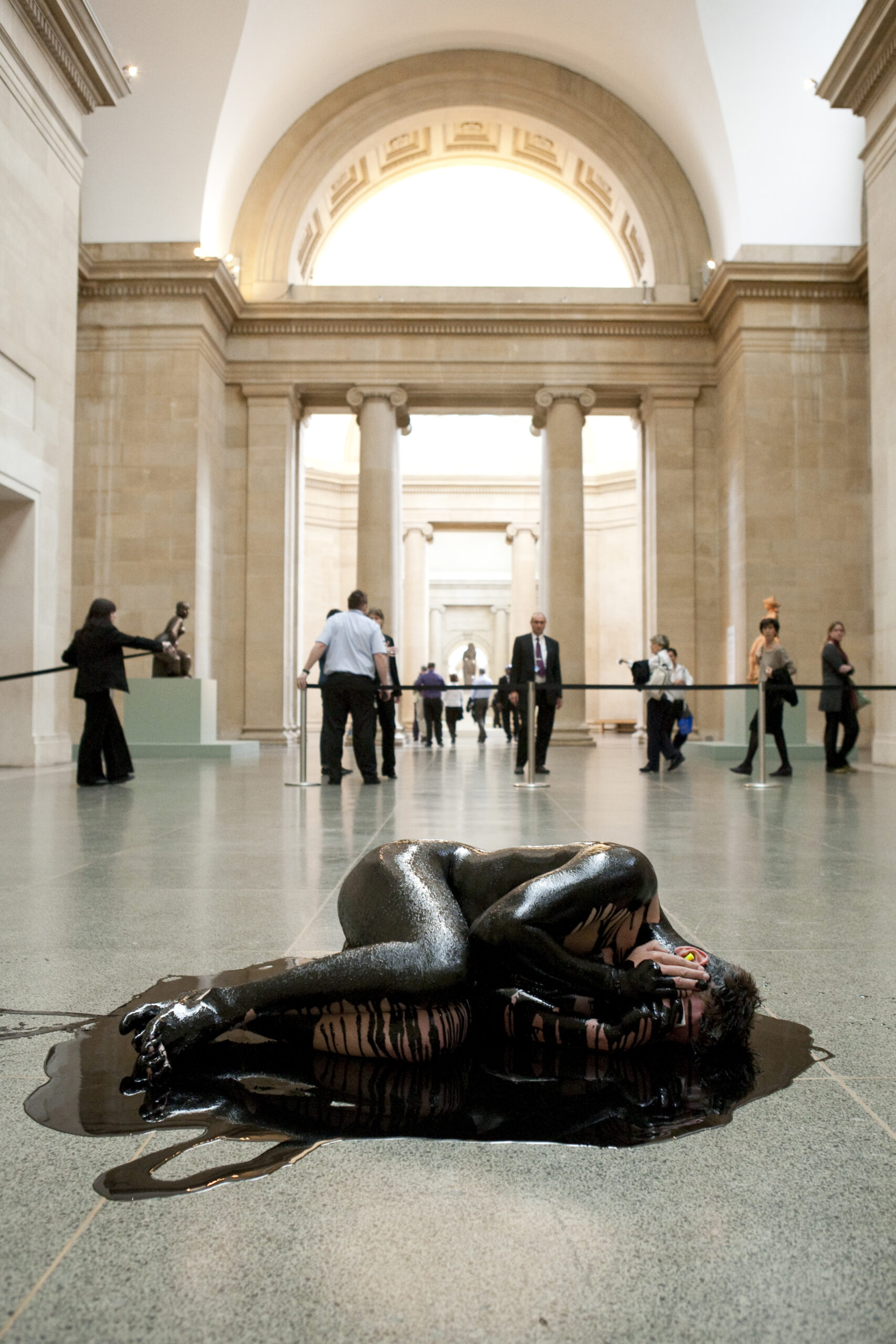Art museums around the world are choosing to divest from the fossil fuel industry. With pressure from climate activists, major institutions have committed to cutting ties with coal, oil, and natural gas companies. Each divestment is a significant win for the global art community, and shines a spotlight on the few museums who remain connected with fossil fuel funding.
Fossil fuels are non-renewable energy sources that are created by the decomposition of the remains of living organisms. When these products are burned, they release vast amounts of carbon dioxide into the atmosphere. This generates a heat-trapping effect and contributes to the overall warming of the planet. Climate scientists have determined that the combustion of fossil fuels is the primary reason for global warming. The impacts of the present climate crisis on human rights are evident.
Where does the art industry stand in relation to fossil fuels?
Fossil fuel companies have a significant history of sponsoring, funding, and donating to art museums. These partnerships have been mutually beneficial: museums receive funding for exhibitions and public programming, and fossil fuel companies receive the benefits of aligning their public images with cultural institutions.
Popularly termed as “artwashing,” this type of alliance enables companies such as ExxonMobil, Shell, and BP to improve their reputations while continuing to contribute to global warming and harm activism efforts.
Speaking on the topic of BP’s previous ties with museums, Anna Galkina of the organization Platform London said that the sponsorship masked BP’s role in wrecking the climate and destroying indigenous lands. Climate activists see these partnerships as a strategic way to cover-up unethical practices.
Another example of this type of alliance is ExxonMobil’s connection to the arts sector. In 2018, ExxonMobil was the fourth-biggest polluter on the planet – contributing to over three percent of total global carbon dioxide emissions since the year 1965. The company was the largest private contributor to greenhouse gases in the U.S. in 2021. Strikingly, the company donated two million dollars to art institutions in 2018.

Similarly, Shell had a twelve-year sponsorship with the National Gallery of Art in Washington, D.C., ConocoPhillips donated 1.9 million dollars to art programs in 2018, and BP held a twenty-six year long sponsorship with the Tate Museums.
Activists say that it is time for museums to break contact with “dirty money.” The divestment movement is centered around institutions cutting ties with fossil fuel companies, with the aim to receive their funding from sources that are not detrimental to the environment. George Osborne, Chair of the British Museum, recently stated that this departure from fossil fuel funding will require a complete reimagination of the museum. Such restructuring will demand innovative forward-thinking that keeps the environment at the center of the discussion.
With renowned institutions such as the British Museum, the National Portrait Gallery in London, and the Louvre ending their relationships with oil and gas companies, the art world takes one step closer to achieving a more sustainable and equitable future.
Activism as an instigator for change
Climate activist groups have been hard at work in bringing about structural changes at art museums around the world. The Liberate Tate movement began in 2010 as a form of “creative disobedience,” with their mission being to protest the Tate Museums’ long-standing connection to oil. Liberate Tate has staged a multitude of public performances over the years, all of which have presented strong calls to action to their viewers.
Liberate Tate’s Human Cost performance of 2011 was a reaction to the BP oil spill in the Gulf of Mexico. The performance featured a naked man who was curled in the fetal position with oil covering his body. Staged in the Duveen Gallery of the Tate Britain, the black oil on the man’s skin contrasted sharply with the clean white neoclassical sculptures on display around him. Human Cost occurred on the first anniversary of the Deepwater Horizon spill and it lasted for eighty-seven minutes, representing the eighty-seven days of the ecological disaster.

Under such public pressure, the Tate Museums officially ended their connection to BP in 2017.
More Work to be Done
On June 9, 2023, when New York City was engulfed in orange smoke from Canadian wildfires, climate activists stationed themselves outside the Museum of Modern Art. The protest was organized by members of the Climate Organizing Hub, New York Communities for Change, and Reclaim Our Tomorrow. These groups are currently calling on the museum to break ties with Henry Kravis, the co-executive chairman and co-founder of KKR – a private equity firm that has invested billions of dollars in fossil fuels. Kravis’ wife, Marie-Josée Kravis, is the chair of the MOMA, and the family have a gallery in their name.
In addition to divesting from fossil fuels, the arts industry is also working to reduce its emissions. The Gallery Climate Coalition is one such organization – founded in 2020, it is working to reduce the art sector’s emissions by 50% by 2030. The GCC promotes zero-waste practices, and it provides a free carbon calculator with which users can determine their business’ carbon footprints. Since the launch of the Coalition, eight hundred art entities from forty countries have committed to lowering their emissions.
Why should we care?
On a global scale, corporations play the largest role in moving the economy toward net zero. With the climate crisis disproportionately affecting racial and ethnic minorities and causing mass displacement, the environmental choices of corporations therefore directly impact people’s lives.
When art museums divest from the fossil fuel industry and engage with activist organizations such as the GCC, they make a powerful statement about the involvement of the arts in driving progress. Through these actions, museums partake in building a more just future and creating meaningful systemic change.
